YoYotta LTO Library options
Tape libraries are hardware units that contain one or more tape drives.
There are also slots inside to store LTO tapes and a robot arm to load and unload tapes.
So this makes it easier to create large archives and also restore media efficiently.
Put the tapes into a Dell, HPE, IBM, MagStor, Oracle SAS, Overland-Tandberg, Qualstar, Quantum,
Spectra, StorageTek or Symply Library and let YoYotta take control
The LTO Library option supports one tape library.
The Multi LTO Library option supports up to four tape libraries connected to a single
Mac.
Then add options to support up to eight LTO drives (any mix of standalone and library
drives)
The Multi LTO Library option supports up to four tape libraries connected to a single Mac.
Then add options to support up to eight LTO drives (any mix of standalone and library drives)
YoYotta can be used with Apple silicon Macs or Intel Macs.
macOS will need software drivers for SAS and FibreChannel
interface cards and Thunderbolt LTO drives.
Thunderbolt units have a SAS LTO drive inside, so they will need a SAS driver.
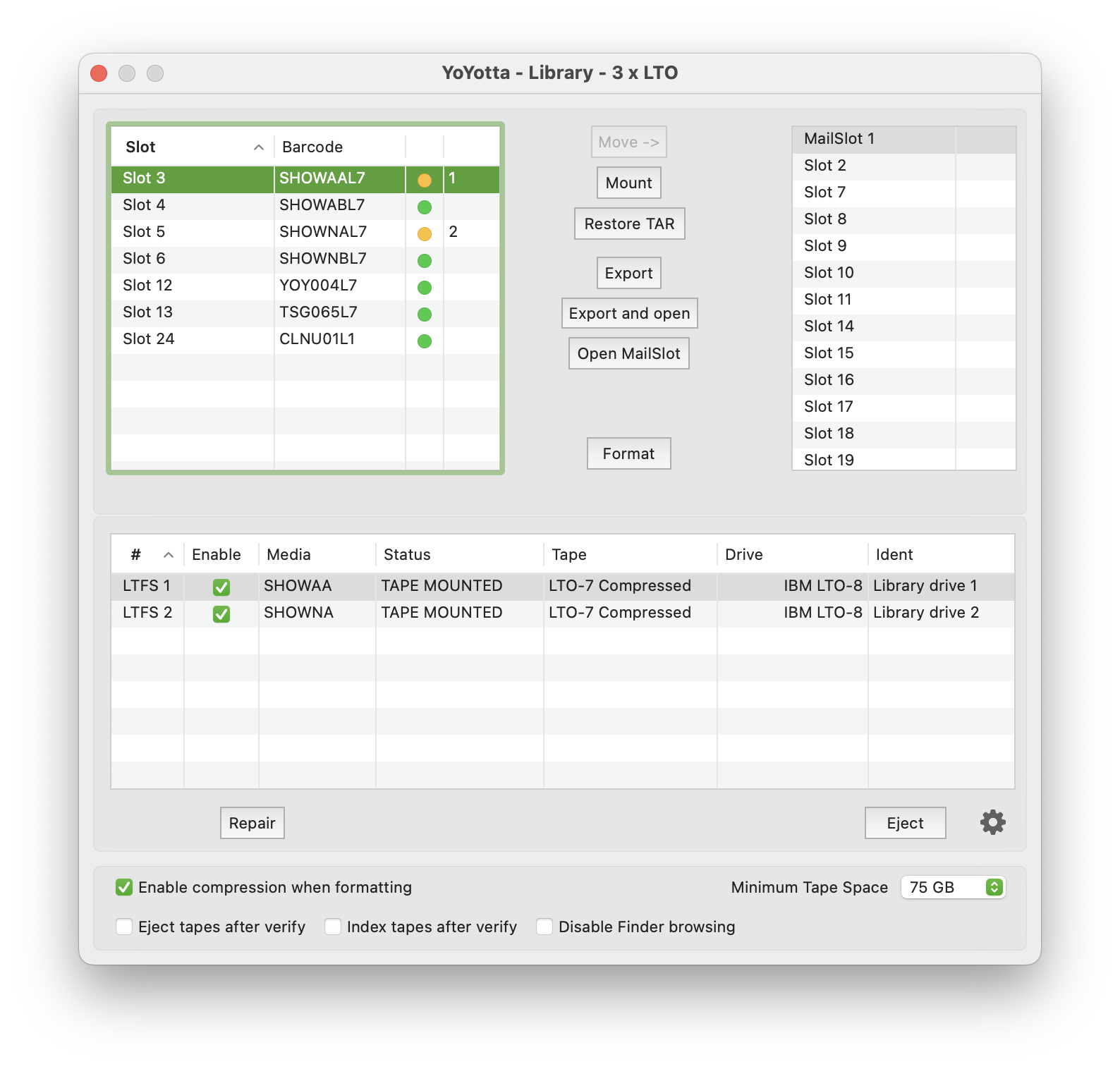
Library tapes and drives
YoYotta monitors the library for tape changes and shows all the loaded tapes on the left and the empty
slots on the right. The tape drives are shown at the bottom. There are buttons to manually move,
format, mount and eject tapes, but YoYotta will do all this automatically.
The LTO Library option supports a single library with up to 180 tape slots.
The Multi Library option supports simultaneous use of up to four tape libraries each with up to 500 tape slots.
Both mail slots and ordinary slots can be used for tapes, so no
spaces are wasted.
However it can be quicker to open just the mail slot on a library rather than the whole tape tray, so the Export button will
automatically move a tape into a mail slot. (This function is not available on all libraries)
When a tape is loaded into a drive, then the table will show a yellow status for that slot.
If a slot is unavailable then a red status will be shown in the table, check that the
library tape trays and mail slots are closed.
When LTO-9 tapes are loaded if a red status is shown then this indicates that the
tapes might not be initialised. YoYotta will not be able to use these tapes. Open the
tape library web interface and run the media wizard or initialisation wizard, this will load the new tapes into a drive
and run the initialisation process.
The slot status will then be shown as green and the tapes can be used.
Newer tape libraries will allow YoYotta to load new LTO-9 tapes directly into the drive, then the initialisation will take place.
Either way this process will take between 20 mins and 2 hours per LTO-9 tape.
All other tape generations including LTO-10 do not use this initialisation process.
With multiple drives you can run multiple jobs at once, any mix of archive and restore.
If drives aren't available then YoYotta will queue the jobs until drives are available.
When the tape library has multiple drives YoYotta decides which drive to use.
It does this by constantly monitors the tape drive usage, so each job will use
the drives with the least head usage. This spreads the usage across all drives, prolonging
drive head life.
All tapes in the library must have a barcode label, six characters identifying the tape and then two characters to identify the tape generation.
Without this the library will not know which tape to load. Do not use the same barcode on multiple tapes. Every tape must have a unique barcode,
If the library drives are of different generations, for example two LTO-7 and one LTO-9 drive then YoYotta will always choose the right drive depending on the tape generation.
If NO BARCODE is shown then either the label is missing or it is unreadable.
Make sure that the full 6+2 barcode label is shown for each tape in the table. For
example here the data tapes all have a suffix of L7 indicating LTO-7.
If only 6 characters are shown in the table then adjust the barcode settings using the LTO library
webpage so that all characters are sent to YoYotta.
For all libraries set left alignment for barcode labels and an 8 character label length.
HPE Barcode Length Reported to Host : 8
IBM Barcode Length returned to Host : 8
Quantum Set Media Barcode Format : Plus Six
Overland Barcode Label Length Rep. to Host : 8
YoYotta supports up to eight LTO drives. However LTO tape drives require a sustained high data rate and it’s not possible for a single storage device to provide enough bus bandwidth to keep 8
restores or 4 jobs writing to dual tape sets.
This would be a typical workflow for a 8 drive library.
Any Apple silicon Mac will have the CPU power to read/write from/to eight tape drives at full speed.
However you will need multiple storage devices.
So the important thing is to check is the source / destination bandwidth.
Network shared storage is unlikely to be sufficient.
Better to have multiple storage devices, ideally direct attached Thunderbolt RAIDs like the Symply SPARK.
With a large library another option is to create two or more library partitions each connected to a Mac running YoYotta.
Splitting up the workflow like this maintains high performance. Use YoYotta Server to sync the metadata from each Mac.
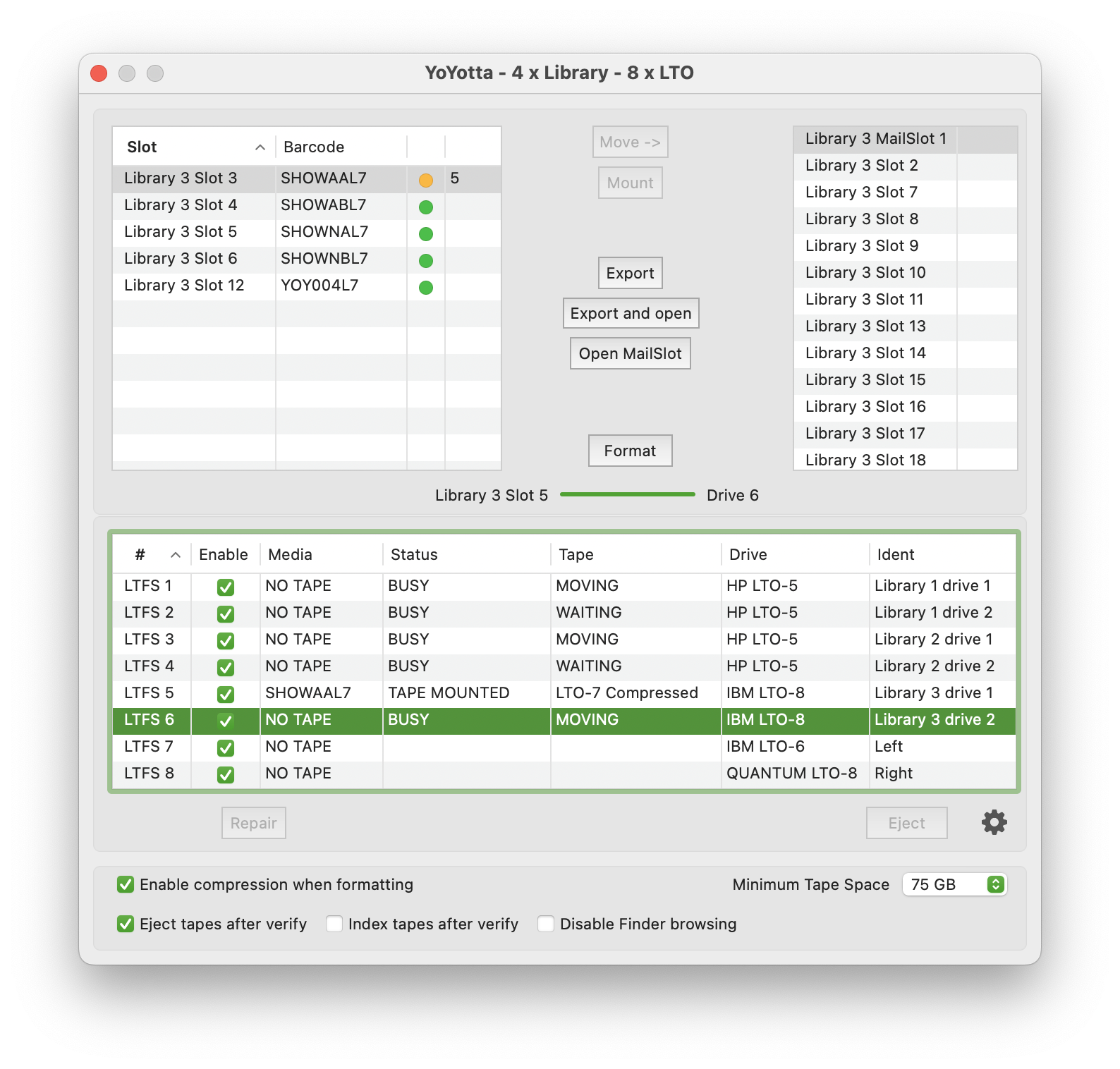
YoYotta LTO Library options
LTO Library
This option supports one tape library connected to a single Mac.
YoYotta will support up to 180 tape slots in the library. There is no limitation on the number of tapes or usage.
YoYotta LTO Drive options will be needed for each tape drive in the library and any standalone tape drives.
Multi LTO Library
This option supports simultaneous use of up to four tape libraries connected to a single Mac.
The libraries can be different makes and models with any generation of LTO tape drives.
Again there is no limitation on the number of tapes or usage.
YoYotta LTO Drive options will be needed for each tape drive in each library and any standalone tape drives.
In the screenshot there are two dual drive LTO-5 libraries, a dual drive LTO-8 library and two
standalone tape drives. Great for migrating tapes. The Multi LTO Library option also supports up to 500 tape slots per
library perfect for those large restore jobs.
Another use case is connecting multiple 1U single tape drive libraries and using
them as different destinations for one or more jobs. Allowing main and safety copies
to be created in parallel.
Note that all tapes for a copy need to be in the same library partition. Each additional copy for the same job can use a different tape library.
Also all tapes for a job need to be of the same generation. Other jobs can be run each using their own tape generation.
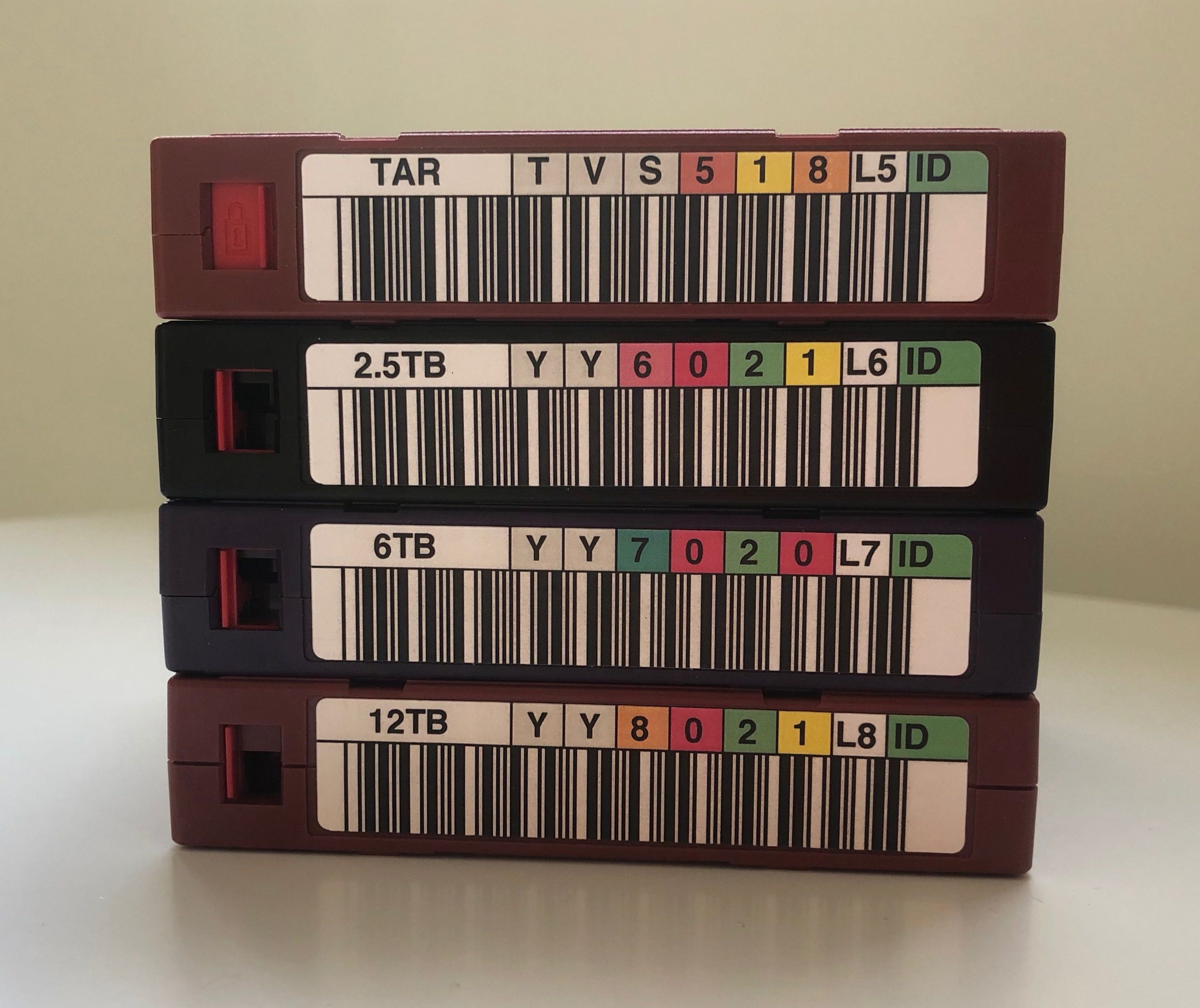
LTO tapes
All tapes must have barcode labels
The labels have a unique 6 character code with either L5, L6, L7, M8, L8, L9 or LA on the end
for LTO-5, LTO-6, LTO-7, LTO-8, LTO-9 or LTO-10 tapes. For example 123456L5, ABCDEFL6, YO1234L6,
17376AL5.
YoYotta will use the barcode to format the tape. No need to manually enter the
barcode. This is an LTO standard, using more than 6 characters means that the tapes will be
difficult to use.
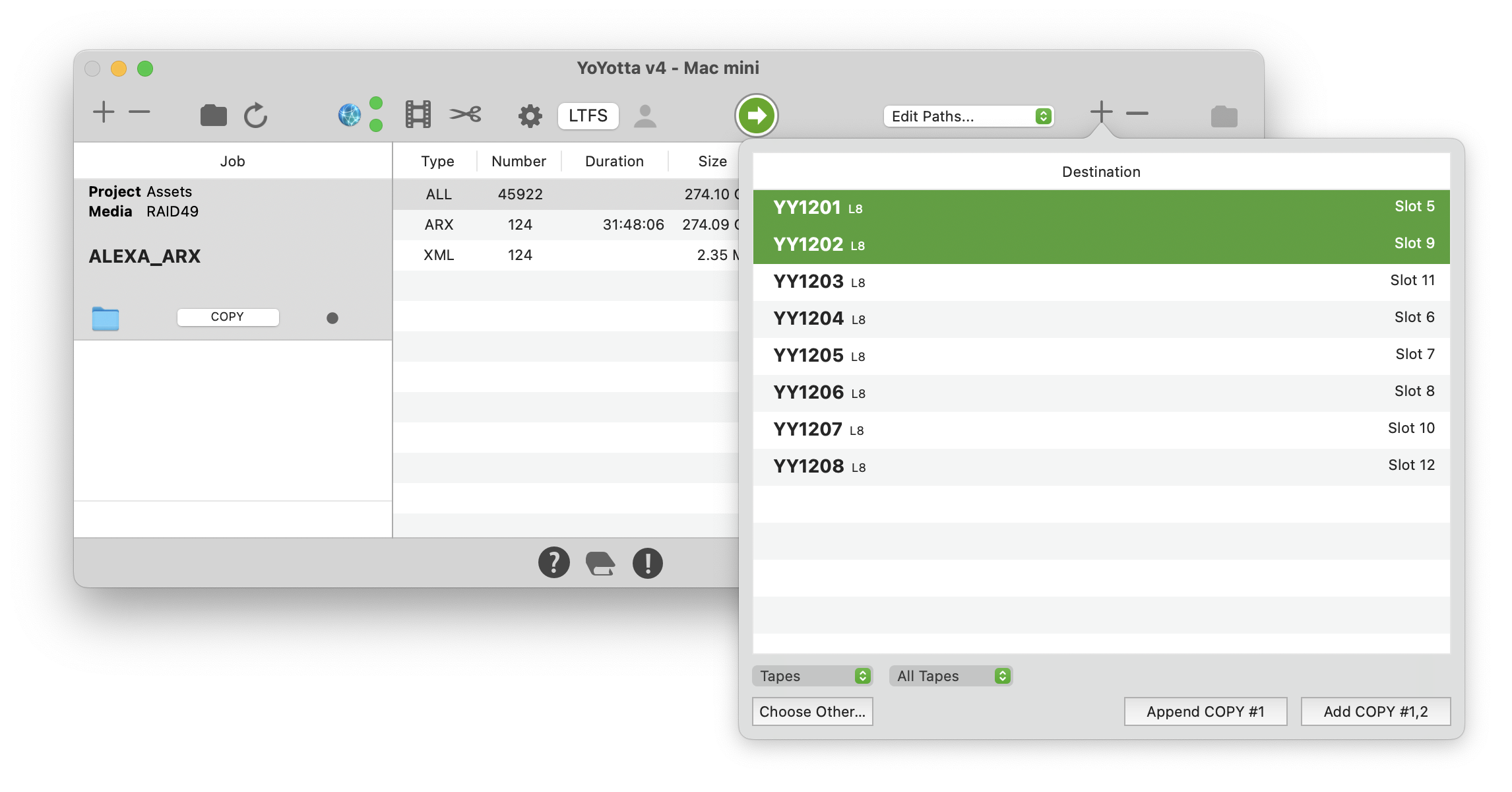
Select the tapes needed for the archive
In this example we have a two drive library and need two copies. So select a main and safety tape
and click Add COPY #1,2.
With a single tape drive run the same job twice to make two copies. Select the first tape and click Add COPY #1.
When the job completes verification, remove the tape from the destination table, select the safety tape and click Add COPY #1 again.
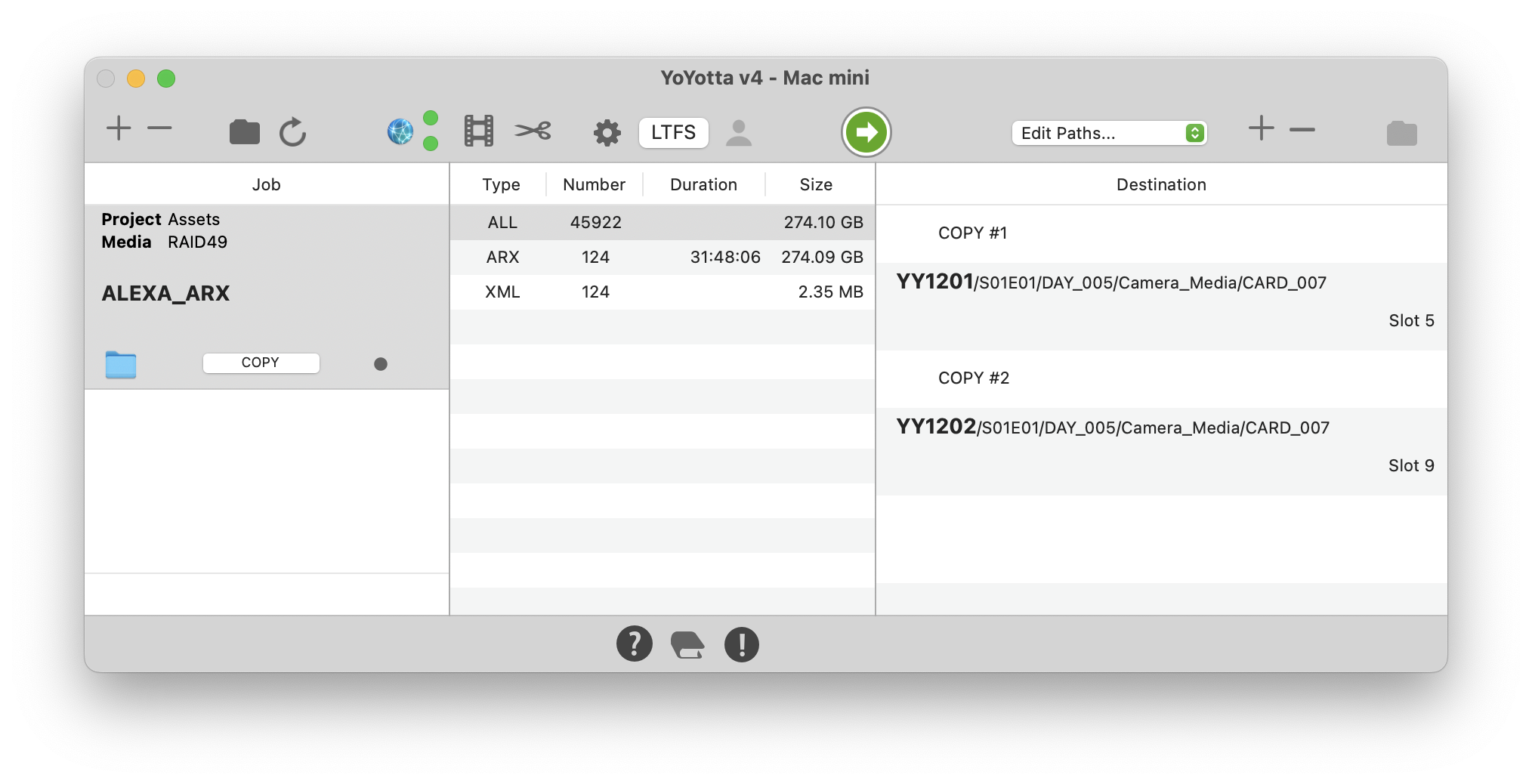
Start the archive
Blank tapes will automatically be formatted with the correct barcode, saving time.
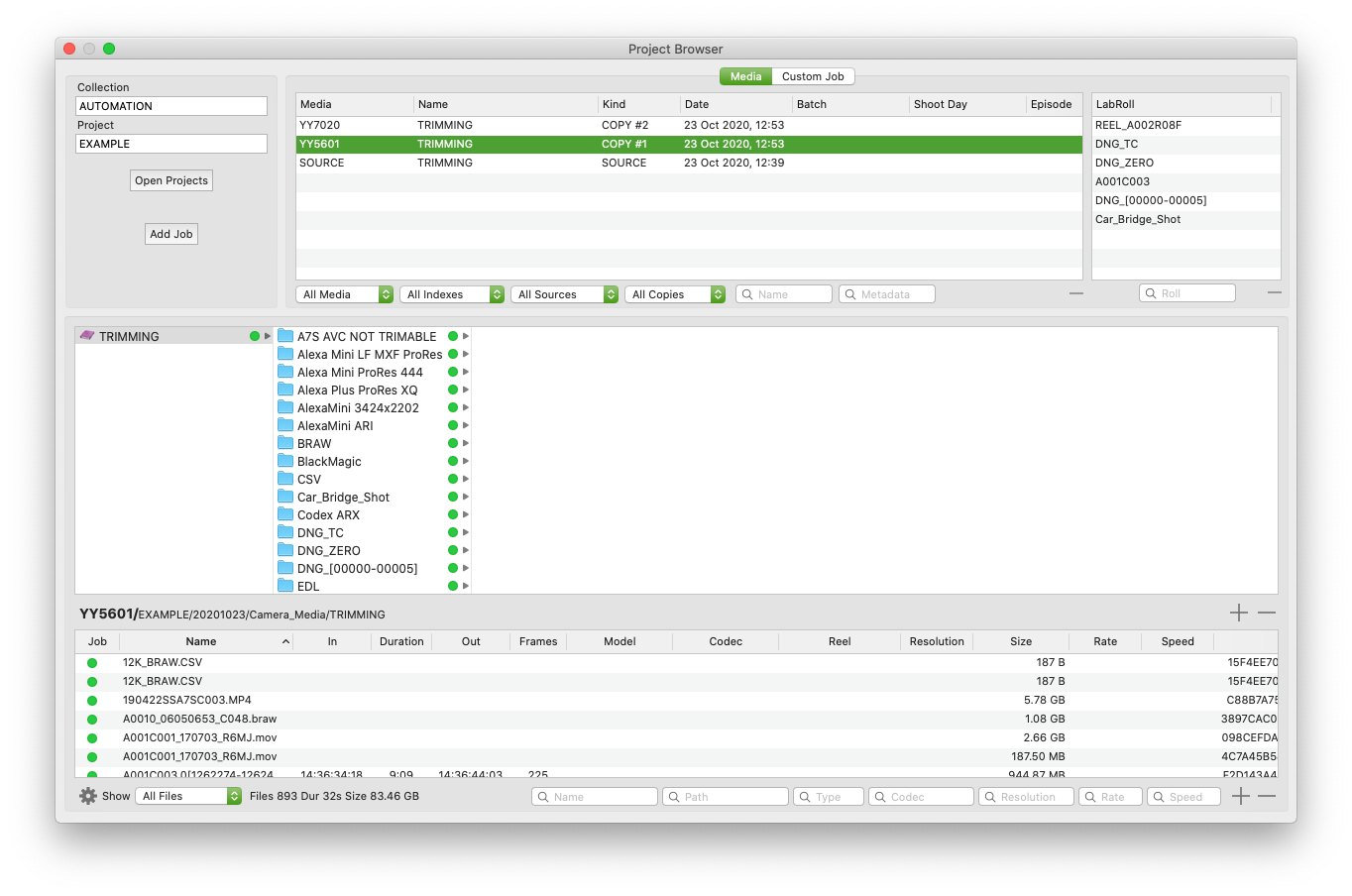
LTO + Asset Metadata
After the archive completes snapshots + metadata for the archived assets will be stored in the Project Browser.
Then Restore files using the Project Browser
Or use the Conform option to restore clips from archive using editorial timeline AAF, ALE, CSV, EDL or FCPXML files
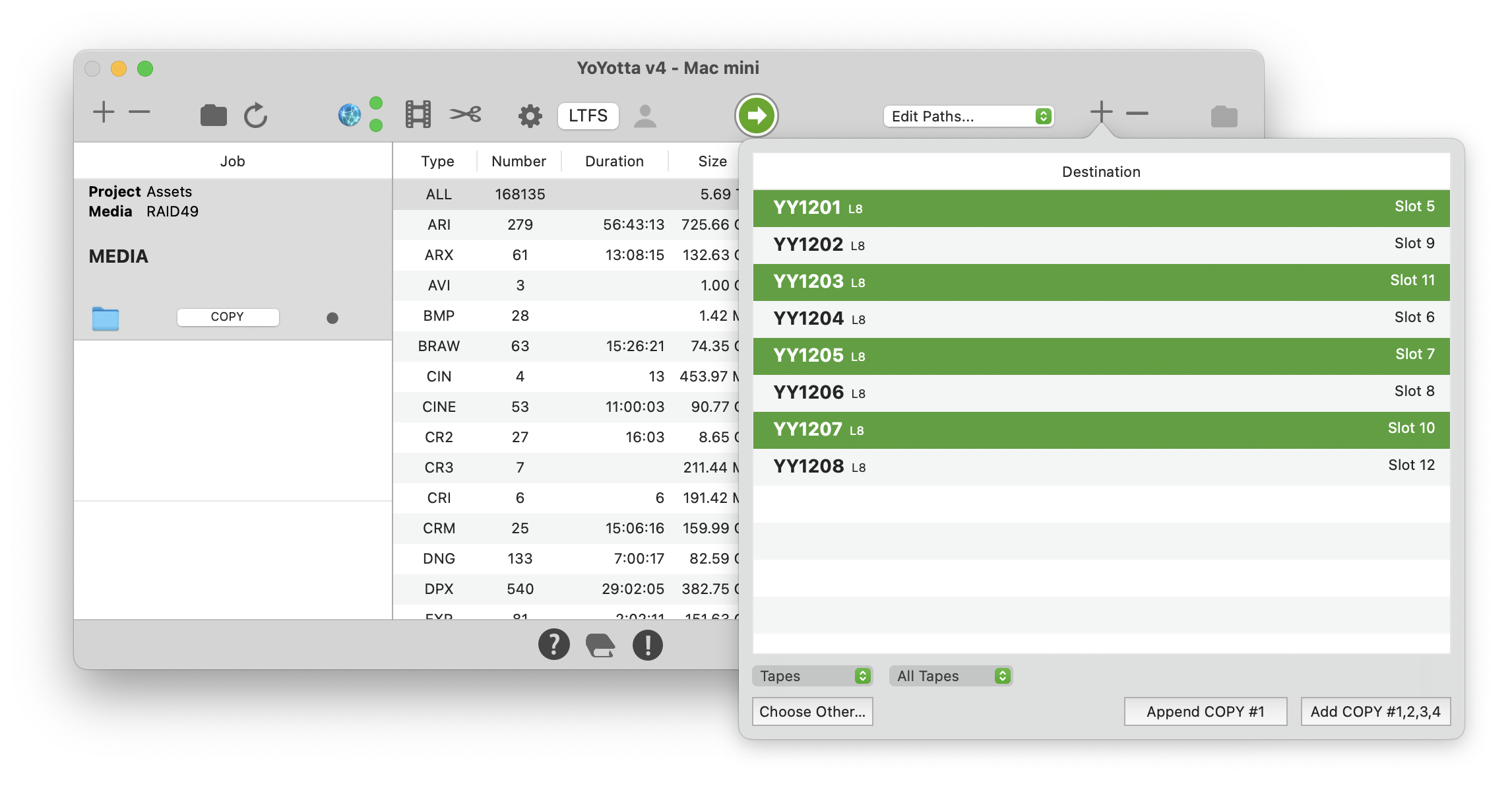
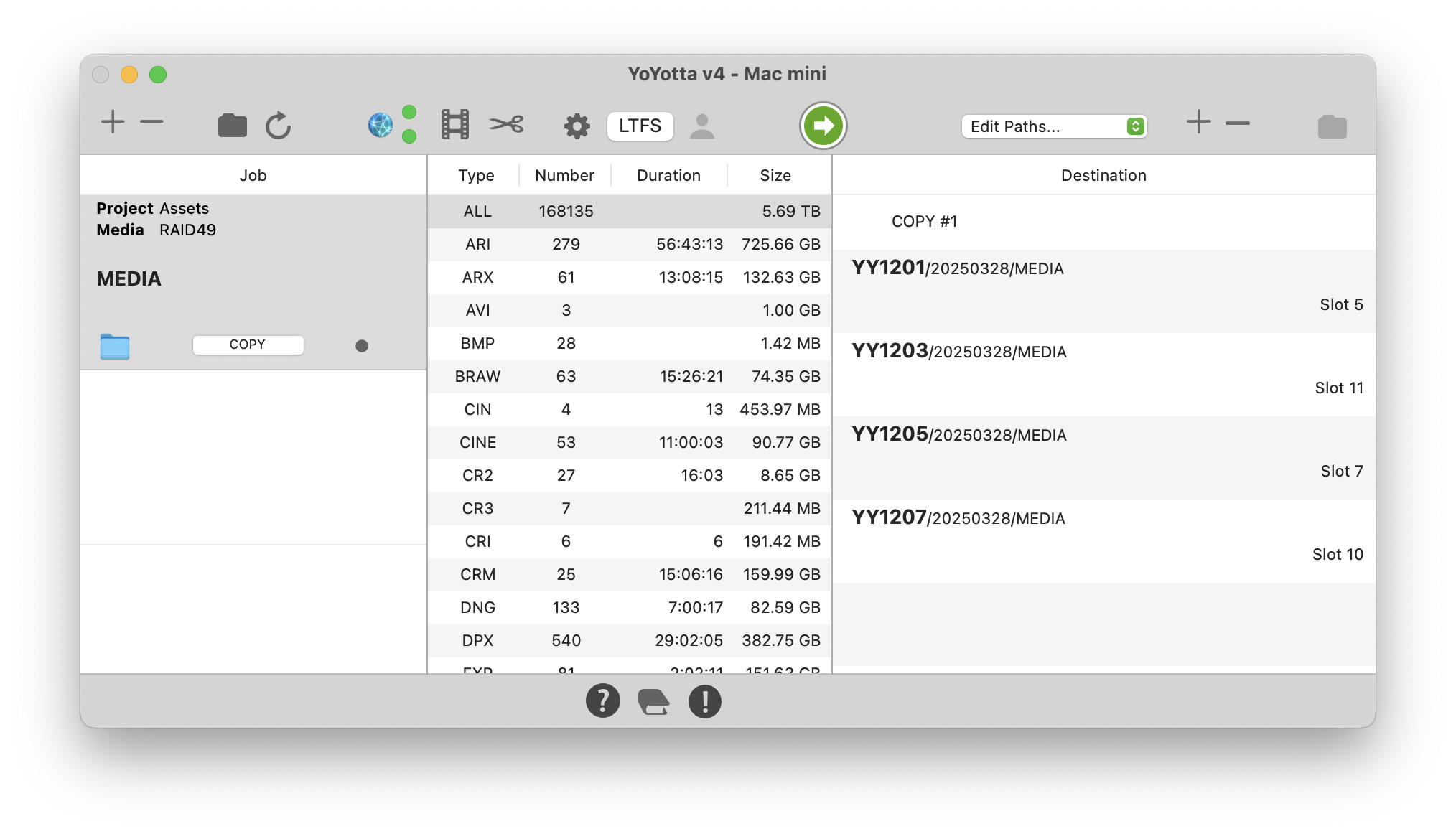
Spanning larger archives across multiple tapes
Add the source folder that needs to be archived. YoYotta will index the folder and show the total size.
Work out roughly how many tapes will be needed, no harm to include one or two extra tapes to the job.
If they are not needed they won't be formatted so they can be used for another job.
Make sure the tapes all have barcode labels and put them into the library in any order using any slots.
Click the + button above the Destination table, select all the tapes and click the Append COPY #1 button.
Start the job.
Tapes will be loaded and formatted automatically (if blank) then mounted and written. No need to open the LTFS panel.
When all files have been written the tapes that have been used will be verified.
On completion the Project Browser will show which files are on each tape.
When archiving you should always create two copies.
If the library only contains one tape drive then the same job can be run for a second time.
When the first set of tapes have been verified then click the minus - button to remove them from the destination table.
Now select the second set of tapes and click Append COPY #1 again. Then start the job again.
When running a spanned archive Quick Verify should be turned off.
The maximum size of a spanned job is limited to the number of slots in the library.
All the tapes for the job must be in the library.
Do not remove any tapes used in the job until it is finished.
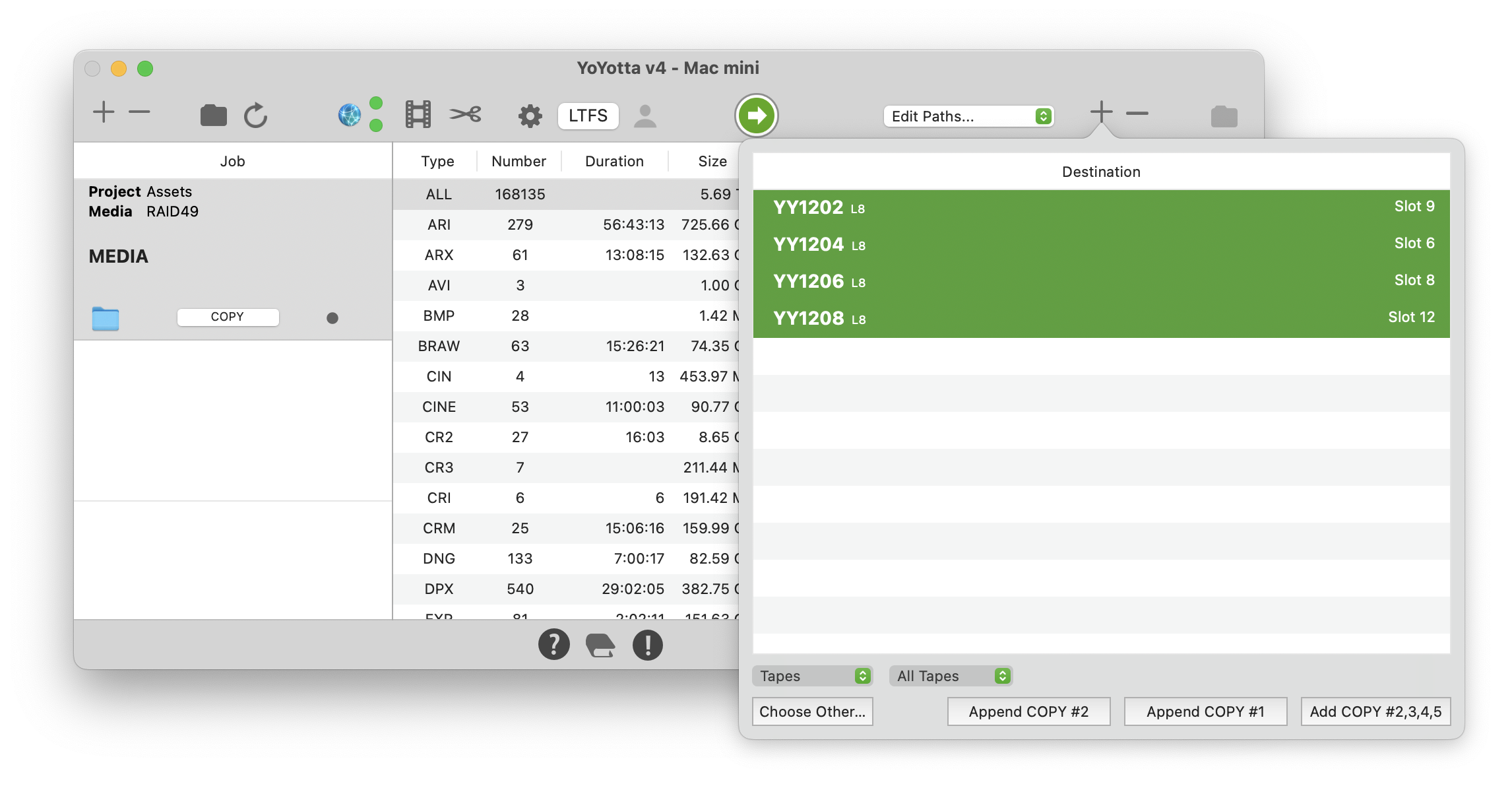
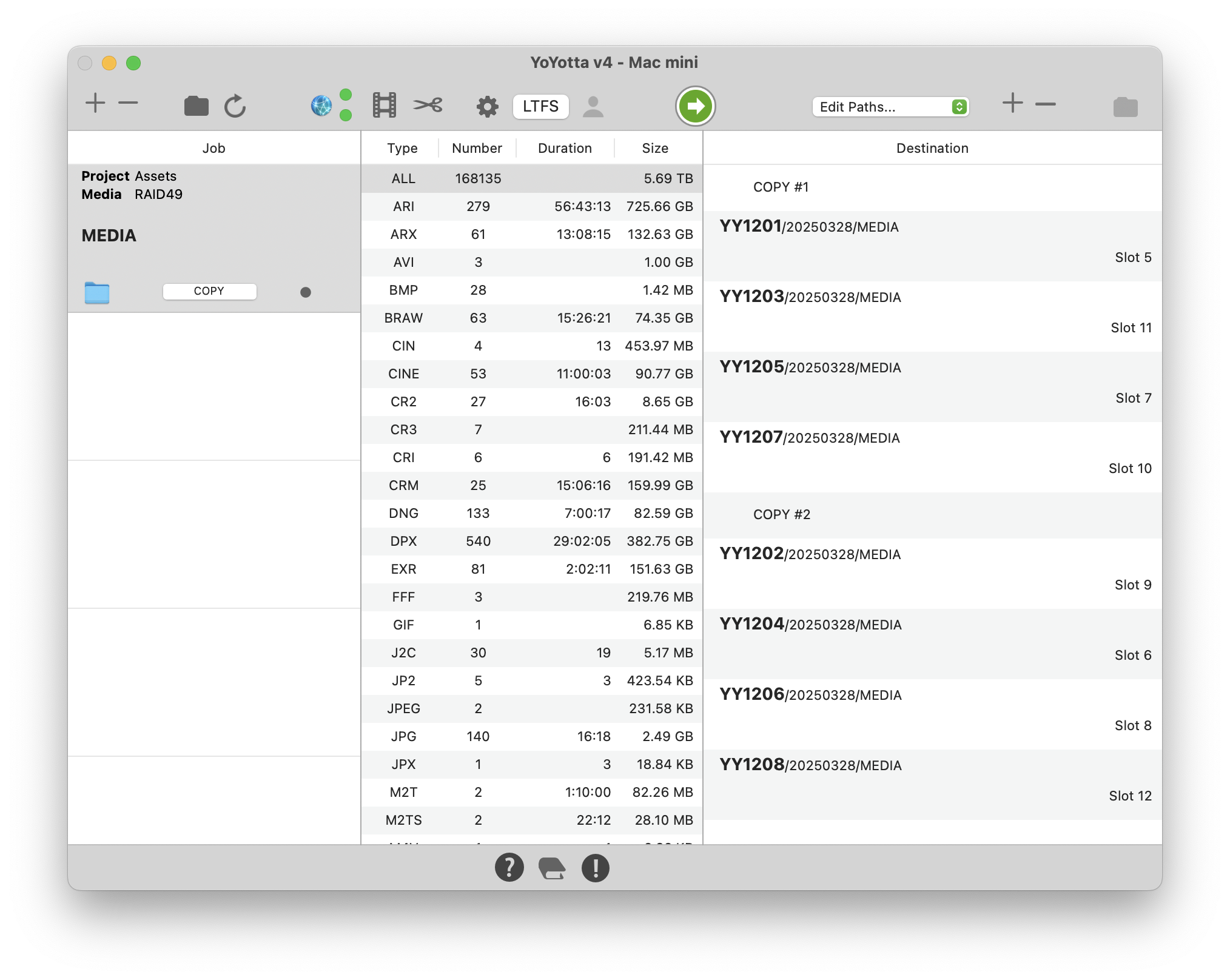
Creating two spanned copies in parallel using a library containing two tape drives
If the library has two or more tape drives then YoYotta can create two copies in parallel, so follow the steps above to setup COPY #1, then select and append the same number of tapes to COPY #2.
The destination table now shows COPY #1 and COPY #2.
The files from the source drive will just be read once and they will be written to both tapes at the same time. Two duplicate sets of tapes will be created in half the time.
If there is just one tape drive, then create a separate job for each tape. Both jobs can be started and the second one will wait until the first job completes.
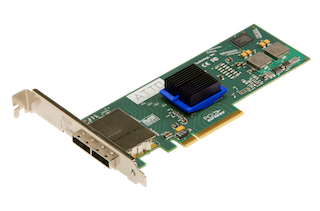
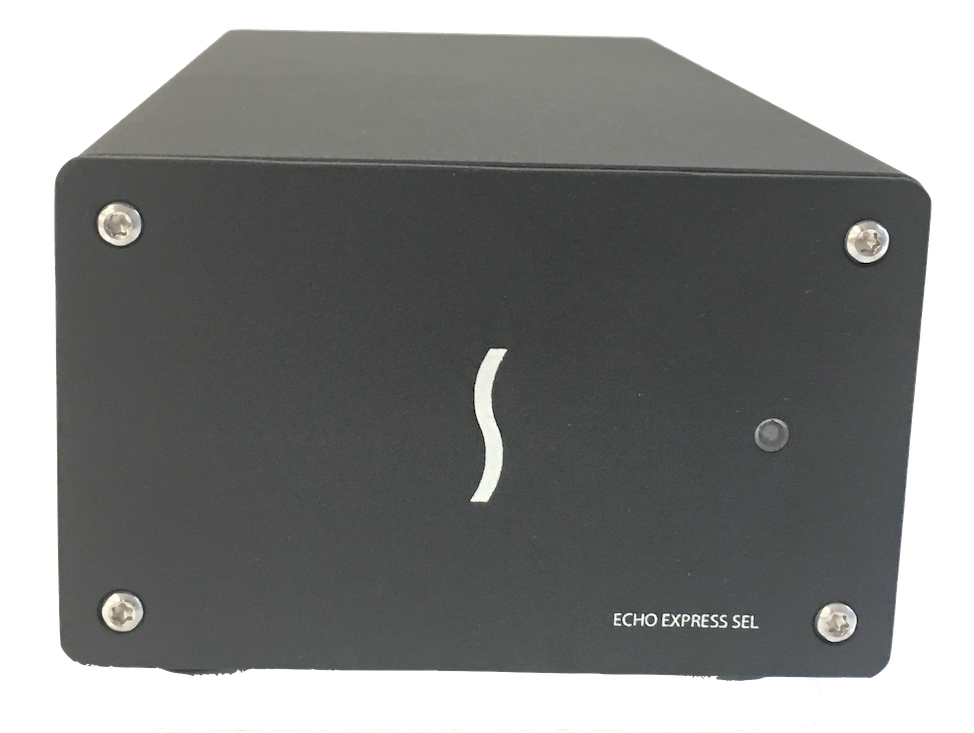
Connecting a library to a Mac
Drives for libraries are available with SAS or Fibre Channel interfaces.
Use SAS libraries, they are cheaper, they use more durable cables, there is no
configuration and SAS gives the same performance.
To connect a SAS or FC LTO drive to the new MacPro use the
ATTO ExpressSAS H680, H1280 or H1280GT PCIe cards from ATTO.
H644 and H608 cards can also be used, but ensure they have the correct SAS connectors for
your drive.
Each SAS connector can control up to four SAS drives using a SFF8088 to 4x SFF8088 cable.
See this link for more details on
the ATTO.
To connect a Thunderbolt Mac to a SAS LTO library use an ATTO H680, H1280 or H1280GT card
inside a Thunderbolt PCIe expansion unit, like the Sonnet Echo Express SEL.
The Sonnet Echo Express SEL is a compact Thunderbolt enclosure that holds a PCIe card like the ATTO SAS cards.
A Thunderbolt enclosure holds one or more PCIe cards. Use this to connect to a desktop SAS LTO drive or tape library.
It is not possible to set the Oracle SL150 control path to use a FC drive. To use it with macOS, there has to be at least one SAS drive in this library and use this as the control path.
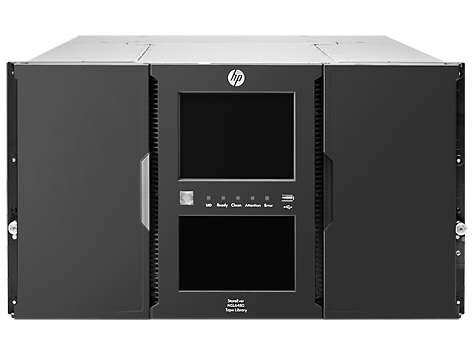
HPE MSL Libraries
The YoYotta Library options support HPE StoreEver 1/8, MSL2024, MSL3040, MSL4048, MSL6480, MSL8096
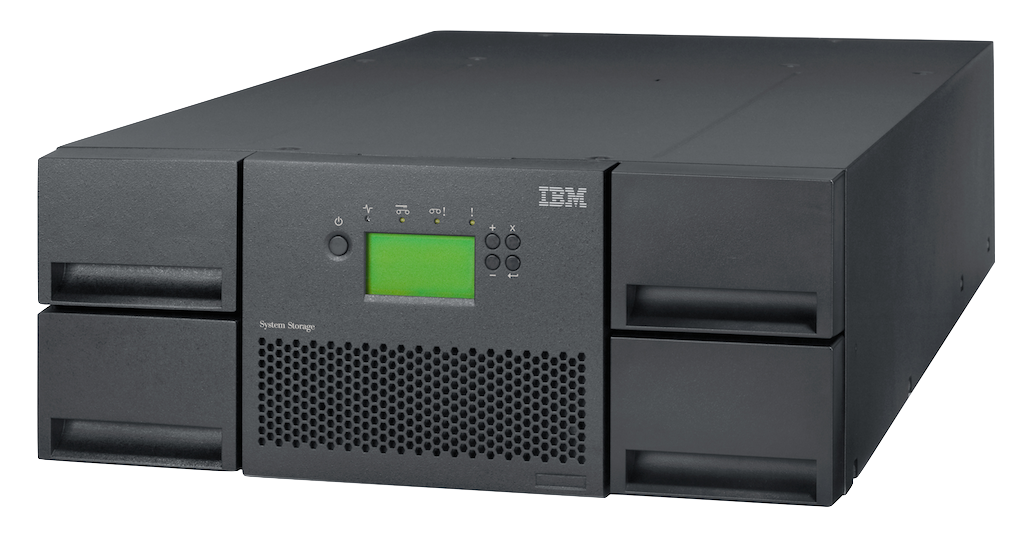
IBM TS Libraries
The YoYotta Library options support IBM TS2900, TS3100, TS3200, TS4300
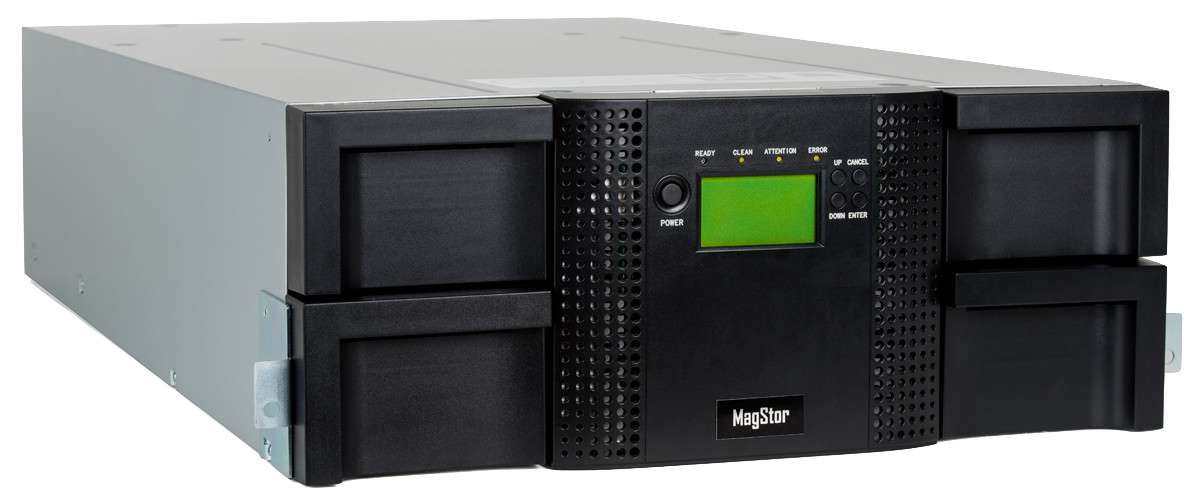
MagStor Libraries
The YoYotta Library options support all MagStor tape libraries including the M1000, M2000, M3000 and the PetaByte Machine M3280
MagStor can also provide support and parts for other makes of tape libraries.
We purchased a MagStor M2000 tape library over four years ago for the YoYotta Lab, it's working well and has archived
many petabytes of data.
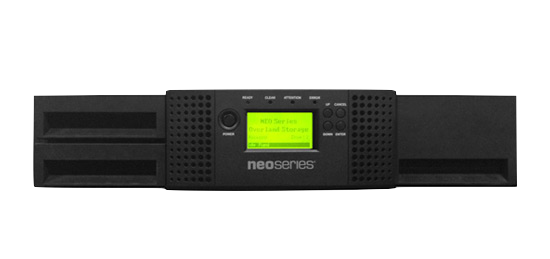
Overland-Tandberg Libraries
The YoYotta Library options support NEO StorageLoader, T24, xl40 and xl80
Overland-Tandberg have closed and are no longer providing support for their tape drives and tape libraries.
Support and spare parts including new library drives can be purchased from MagStor.
There is more information here about MagStor's support for Overland Tandberg users
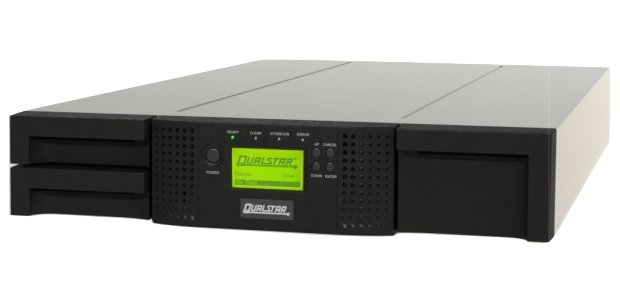
Qualstar Libraries
The YoYotta Library options support Q8, Q24, Q40, Q48 and Q80 tape libraries

Quantum Libraries
The YoYotta Library options support Quantum i3, i6, SuperLoader 3, i40, i80 and i500

Spectra Libraries
The YoYotta Library options support Spectra Stack, T50e and T120

Symply Libraries
The YoYotta Library options support all the Symply tape libraries including the PRO XTL 8, 24, 40 and 80